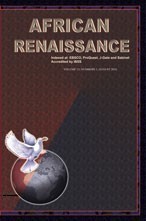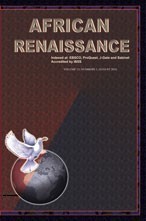
 editor@adonis-abbey.com
editor@adonis-abbey.com ![]() UK: 0207 795 8187 / Nigeria:+234 705 807 8841
UK: 0207 795 8187 / Nigeria:+234 705 807 8841

Publication Frequency: Quarterly (Four times a year) (ISSN 1744-2532 E- ISSN 2516-5305). SCImago Journal Ranking for 2024: Quartile: Q3; SJR: 0.165
View Table of Content
African Renaissance Vol. 22, (No. 4), December 2025
African politics is experiencing a multidimensional crisis. This crisis ranges from acute underdevelopment, violent conflict, governance and administrative malaise, the continentalisation of xenophobia and the impacts of the instability of the international system, among others. These are contributing to challenge the continent’s drive towards social, economic and political stability. Many of the continent’s countries are teetering towards state failure as governments and their institutions continue to demonstrate acute incapability to effectively govern their respective territories. African Renaissance, in line with its tradition of academic and editorial excellence, continues to offer itself as a viable platform to discuss these issues with the aim of proffering sound and practical multidimensional policy recommendations to address them. The articles in this issue expertly interrogate the intersection of politics, knowledge, and governance, providing a robust platf...
View Table of Content
African Renaissance Vol. 22, (No. 3), September 2025
African Renaissance is a journal that has a track record of commitment to espousing the dynamics of politics in Africa. This commitment is borne out of the realisation that the link between politics and development continues to receive academic attention, especially as it unfolds on the continent. The state as a political community embodies the drive towards development. Plato’s stance on the state and its utility for development shows that it is necessary to engage the state and its processes to ensure that it delivers its mandate. Thus, there is a growing aberration in Africa as politics is engendering everything but development. The state in Africa is shirking from its mandate to galvanise its political process towards the upliftment of its institutions and the well-being of the people. Hence, violence, socioeconomic decay, political instability, corruption, endemic poverty and acute infrastructure inadequacy, among others, are now the daily lived reality of the Africans. Add...
View Table of Content
African Renaissance Special Issue, July 2025
Africa occupies a critical strategic position in today’s world, due to its vast natural resources. Despite this wealth, the continent faces significant challenges that hinder its sustainable development. A major obstacle is the enduring impact of imperial ideologies and the exploitation of resources by European colonial powers. Colonization disrupted Africa’s progress, leading to stagnation in socio-economic development and inflicting lasting damage on its social structures. Traditional methods of conflict resolution were dismantled, replaced by a culture of violence and authoritarianism that stifled democratic growth. With the end of colonial rule, a new elite emerged, often influenced by the very systems that oppressed their people. Instead of empowering their communities, these elites frequently continued the cycle of oppression, serving external interests rather than the aspirations of their citizens. It is crucial to address these historical injustices to unlock Africa...
View Table of Content
African Renaissance Vol. 22, (No. 2), June 2025
Politics is central to societal growth and development. Given its allocative function, the dynamics of politics continue to define the trajectory of nations in the world. This is to the extent that attention is now being paid to politics and those who drive governance through it more than ever. While, for example, elections do not equate democracy, they have come to be taken as a critical aspect of the politics of nations. For African countries, efforts are now being made to ensure that politics lead to development. Recent reversion to military rule in some countries on the continent has been blamed on the failure of leaders to ensure that politics lead to development. The seeming popularity of these military takeovers shows the disenchantment of the people with the political processes of their countries, which has deepened them into poverty and a crisis of development over the years. The development serves as a wake-up call for African leaders to ensure a sound and orderly political p...
View Table of Content
African Renaissance Vol. 22, (No. 1), March 2025
Political dynamics across the African continent are becoming very tense and one is forced to begin to question the democratic credentials of many African countries in this regard. Given the centrality of the political process to the overall development of nations, the growing nervy nature of this process in many countries is a serious cause for concern. Democracy has unraveled immensely across the continent with serious democratic reversals. This is demonstrated in the return of military coups in West African countries of Burkina Faso, Guinea, Mali and Niger. This development raised serious regional tensions in West Africa, shaking the Economic Community of West African States (ECOWAS) to its roots and causing unprecedented diplomatic face-offs between member states. The fact that most of these coups are popular among the citizens of the affected countries raises fundamental questions about the quality of leadership emerging from democracy in Africa. In the same vein, insecurity...
View Table of Content
African Renaissance Vol. 21, (No. 4), December 2024
Local and domestic forces shape African reality by upholding power structures that have an impact on knowledge as well. Even while the continent has a lot of potential for reconstruction and renewal, new kinds of control and discrimination put a lot of strain on the region's constant struggle between optimism and despair, renaissance and marginalization. The wealth of Africa and its economic interconnectedness with the rest of the globe must unavoidably lead to improvements in human development if the continent is to experience a rebirth and rebuild. Following the independence of the majority of African nations from colonial imperialists, expectations were built based mostly on the belief that Africa would rapidly advance and that African leaders would lead its governance and politics. These hopes might have been influenced in part by the fervent resistance of African nationalist leaders to colonial imperialism and the liberation of Africa from its shackles. But as we can see from cont...
View Table of Content
African Renaissance Special Issue, October 2024
This special issue draws from a collection of interdisciplinary research to investigate the interplay of underdevelopment, corruption, and poverty in Sub-Saharan Africa. Using case studies from mostly four countries —Nigeria, South Africa, Burundi and Zimbabwe, the essays here-in explore the intricate web of challenges and opportunities that define these elements across the region. From examining the transnational dynamics that facilitate the persistence of corruption, economic underdevelopment, and poverty in the region, to evaluating the continuous impact of such elements on youth behaviour across regional borders and boundaries, the essays aim to identify innovative strategies, policy interventions, and grassroots initiatives that hold the potential to foster sustainable progress and bring about positive changes across the region. Ultimately, the articles offer valuable insights into the complexities and nuances of the challenges faced by these nations and suggest pathways toward ...
View Table of Content
African Renaissance Vol. 21, (No. 3), September 2024
Global optimism over sustainable development has been voiced in academic debates and forecasts. The picture for Africa is not nearly as hopeful, given the persistent declines in hunger, poverty reduction, effective accountability and governance, efficient healthcare delivery, and citizen satisfaction with public goods and services. The peace and stability of the continent are thus threatened by provocative acts and behaviors. Because Africa is incapable of implementing and maintaining drastic measures that can stop the continent's decline within a comprehensive and integrated strategy that prioritizes democratic governance, economic growth, and fair wealth distribution as prerequisites for peace and security, the continent has remained largely unstable and underdeveloped. In many severely mismanaged African states, violent protests or uprisings are a continual concern. The current upheavals and riots are some of the signs of a weak government and the prolonging of the tenure of some un...
View Table of Content
African Renaissance Special Issue, August 2024
The dynamics of diversity and the massive endowment of natural resources in Africa make it a worthwhile and strategic region for scientific investigation. This investigation becomes very necessary in light of how the western media have always labeled Africa as a sore continent characterized by violence, diseases, bad governance, poor service delivery, weak political will and institutions, poverty, inequality, climate change, and other related problems. Although these problems have generated public and intellectual discussions within and outside Africa, the suggested solutions appear to be western ideology-laden. In other words, the nature of these solutions is not evolving towards reflecting efforts at genuinely transforming or improving Africa. This is so because the democracy that seems to renew hope for Africa’s development has largely remained unpopular in some African states. This state of affairs was a factor in the thinking of Afrocentric solutions to African problems beca...
View Table of Content
African Renaissance Vol. 21, (No. 2), June 2024
African politics continue to elicit profound interest within and outside the continent. In recent decades, the political processes of African countries have attracted global interest. This is probably due to the developmental and other crises facing the continent. This interest is once again aglow with a series of consequential elections coming up on the continent. Senegal led the race with an electoral process that was almost scuttled by Africa’s age-long malaise of sighttight syndrome in power. However, the Senegal judiciary showed that the African judiciary can help midwife electoral systems based on justice, fairness, equity, and constitutionalism. The election was also noteworthy as it threw up the continent’s youngest democratically elected president. The just-concluded elections in South Africa also proved that Africans are ready to challenge social, economic, and political challenges via the polls, with the result showing that the African National Congress (ANC) lost its majori...
To subscribe to any of the journals, Please Email Us.














